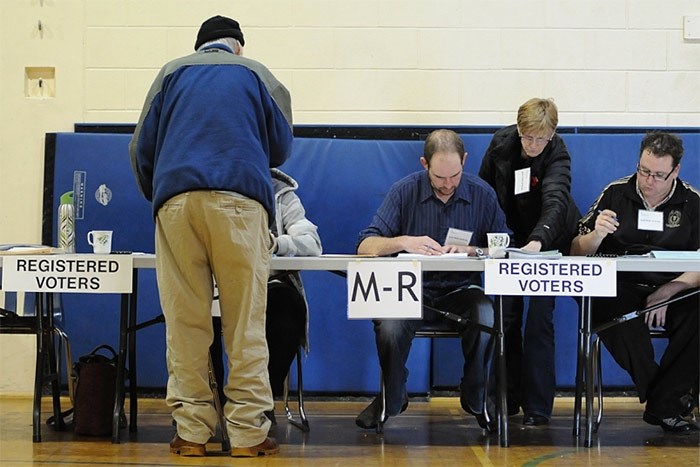 Advance voting for the Oct. 14 byelection is on Oct. 4 and 10. File photo Dan Toulgoet
Advance voting for the Oct. 14 byelection is on Oct. 4 and 10. File photo Dan Toulgoet
Byelection day is nearing in Â鶹´«Ă˝Ół»and residents can start casting a ballot as early as this week.
General election day isn’t until Oct. 14, but the city is holding two days of advance voting on Oct. 4 and 10. Polls will be open from 8 a.m. until 8 p.m. at city hall both days.
The city sent out information about the byelection last week, it includes everything residents need to know about voting.
One change for the byelection is that the city is not issuing voter information cards — replacing the cards with the informational flier delivered by mail last week. It contains information about when and where to vote, and how to register.
Another change this election, said Janice MacKenzie, the city’s chief election officer, is on Oct. 14 residents can vote at any of the 50 polling stations across the city. Only people living on the University Endowment Lands are required to vote at a specific polling station at University Hill Secondary. MacKenzie said that’s because those residents are only electing school board trustees and have a different ballot.
Twenty-eight candidates are vying for office in Vancouver’s Oct. 14 byelection — nine for the council seat vacated by Vision Vancouver’s Geoff Meggs who resigned to work for Premier John Horgan and 19 for the nine school board seats left empty after then-Liberal education minister Mike Bernier fired the previous slate of trustees in October 2016.
Council candidates include the NPA’s Hector Bremner, Vision Vancouver’s Diego Cardona, Sensible Vancouver’s Mary Jean “Watermelon” Dunsdon, the Green Party’s Pete Fry, OneCity’s Judy Graves and independents Gary Lee, Damian J. Murphy, Jean Swanson and Joshua Wasilenkoff.
School board candidates include Vision Vancouver’s Joy Alexander, Ken Clement, Theodora Lamb, Mike Lombardi and Allan Wong, while the NPA is fielding Fraser Ballantyne, Lisa Dominato, Robert McDowell, Julian Prieto and Christopher Richardson. The Green Party’s candidates include Janet Fraser, Estrellita Gonzalez and Judy Zaichkowsky. OneCity is running two candidates, Carrie Bercic and Erica Jaaf, while COPE is running Diana Day. Jamie Lee Hamilton is on the ticket for IDEA Vancouver, while two independent candidates, Christine Arnold and Adi Pick, put their names forward.
Who can vote?
In order to vote in the byelection, you must be:
- 18 years of age or older on general election day
- A Canadian citizen
- A resident of B.C. for at least six months
- A resident of Â鶹´«Ă˝Ół»for at least 30 days
- Not be disqualified from voting by law
Are you registered?
Residents registered in the last provincial election may already be on the voters’ list. Not sure? Visit and click on “Voter registration and ID.”
If you’re not on the list, you can register at any polling station. Residents registering will need to show two pieces of identification, at least one with a signature, and complete and sign a voter registration form. Residents can also swear a declaration, which counts as one of the pieces of identification.
Common accepted forms of ID include:
- B.C. drivers licence
- B.C. services card
- B.C. ID
- B.C. Care Card
- Social insurance card
- Citizenship car
- Credit or debit card
- Passport
- Utility bill
Voter registration forms can be downloaded in advance at .
Residents who cannot make it to a polling station due to illness, injury, disability or who plan to be away from the city during voting days, can request a mail-in ballot. Ballots can be requested by calling 311, or visiting .
The city will have accessibility aids available for those residents who need them, but only during advance voting days. The accessibility aids include a sip and puff device, audio system with headphones to read the ballot and a magnification device to enlarge the ballot.
Most polling stations are wheelchair accessible and staff is able to help with curb-side voting for people unable to leave their vehicle to vote.
Interpreters are allowed to help those who need it and many polling stations will have staff on hand who speak other languages. As well, all staff will have direct phone access to translation services for more than 180 languages.
Read more from the


